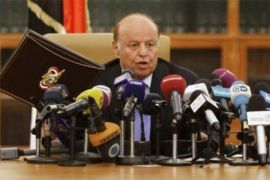The defence ministry said in a statement on its website that three "local Al-Qaeda leaders" were killed in a Yemeni air strike late Saturday while a security official told AFP the raid was conducted by a US drone.
The official, who spoke on condition of anonymity, said the strike hit a moving vehicle carrying Al-Qaeda operatives in the province of Bayda, some 210 kilometres (130 miles) southeast of the capital Sanaa.
The ministry, however, maintained the government`s routine insistance that only its aircraft carry out such operations on Yemeni soil.
The United States has never formally acknowledged the use of drones against Al-Qaeda in Yemen, considered by Washington to be the most active and deadly branch of the global terror network and a major focus of its "war on terror."
The three children, including two siblings, were killed Sunday when a roadside bomb exploded in the eastern province of Hadramawt, a security official told AFP.
He blamed Al-Qaeda militants for planting the device and said a "suspicious vehicle" had been spotted in the area the night before.
The children were killed while walking to school by what the official described as an improvised "time bomb."
In other violence Sunday, one person was killed and at least five others were wounded, including two women, in an Al-Qaeda mortar attack on the southern town of Loder, a security official told AFP.
The victim was a member of a committee of armed residents fighting alongside the Yemeni army, the official added.
He said "sporadic" clashes continued in the strategic town where last week fierce battles raged between militants and the army.
At least 222 people, including 183 militants, were killed in five days as Al-Qaeda tried to seize the town.
On Saturday, suspected Al-Qaeda gunmen kidnapped a Yemeni officer and two of his aides in Bayda province, a security official told AFP on condition of anonymity. He gave no further details.
Al-Qaeda has exploited a decline in central government control that accompanied Arab Spring-inspired protests that eventually forced president Ali Abdullah Saleh to cede power.
Since May last year, the extremist group`s Yemen branch, known as the Partisans of Sharia (Islamic law), has seized several towns in the lawless south and east, including Zinjibar, capital of the southern Abyan province. (*)
Editor: Kunto Wibisono
Copyright © ANTARA 2012


